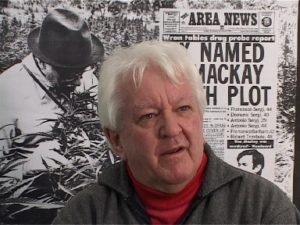The award-winning author and journalist Tony Reeves was your classic leftie, a genuine class warrior and true believer. He strove hard to be a modest and common man but was continually undermined by his uncommon compassion, commitment, larrikinism, humanity and grace.
He defied being pigeonholed but would not have objected to being variously labelled as a Marxist and a socialist – he would proclaim in a rare deviation from his unswerving atheism, “God forbid, call me anything but a rat and class traitor, an ‘effing’ Trotskyist”.
Tony Reeves was born on May 6, 1940 in Essex, then the family moved to Wales, away from the war. Treeves, as he was commonly known, learnt the language and his later Welsh choirboy impersonations were frightening.
In 1954 Treeves moved to Australia and turned his hand successfully to activities from cultivating roses to silversmithing, and also sewing. But his innate love of life, dedication to truth, unavowed commitment to bolshie left-wing beliefs and love of all things wordy and English led him into journalism.
No formal education, no degrees, but an uncanny love of the language and unadulterated life experience drew him to journalism on the chance he may be able to right the wrongs in his obsessive dislike of perpetrated corruption, deception, duplicity and outright criminal tendencies.
Starting as a copyboy on The Daily Telegraph, Reeves worked through his grades – no mean feat as he had no respect for authoritarian chiefs-of-staff and editors. He quickly became an investigative journalist and went on to work at the Daily Mirror, The Sunday Telegraph, the Sunday Australian, the Nation Review and the ABC. It was his forensic and multi-dimensional reporting that helped to bring about the Moffitt royal commission into organised crime.
In 1975 Reeves joined his close friend and investigative journalist Barry Ward in trying to unravel the apparent murder of Kings Cross newspaper publisher Juanita Nielsen.
They were continually rebuffed in their efforts to have the book published or to force a commission of inquiry to expose the truth behind this sordid tale of police and political corruption, of betrayal and heinous brutality.
Early on in Australia, Reeves also decided that the Labor Party was the best vehicle to implement his radical agenda, particularly his fearless advocacy of public housing, public transport and support of the green bans movement.
His drive and energy led him to spend seven years as a councillor on the Sydney City Council from September 1977.
Reeves fought to preserve Sydney’s historic sites from demolition and worked overtime to save inner-city suburbs, such as Woolloomooloo and The Rocks.
He was prepared to talk any time on urban conservation and his various campaigns saved many inner-urban tenants of low-rental homes from eviction and communities from disruption and dislocation.
In 1992, he moved to Queensland with his partner Kamala and organised a super-leftie branch of the ALP.
He was impressed by a rather left-wing barrister at one meeting saying, “I would far prefer to have a small cadre of left-wing comrades in this branch than a thousand careerist apparatchiks destined to embrace the ministerial leather in some sellout Labor government.”
In Brisbane Reeves returned to his freelance writing and publishing career. His interest was rekindled in investigating the criminal behaviour and corruption he had witnessed first hand as a young reporter in Sydney. His first book Mr Big: Lennie McPherson and His Life of Crime (2007) won the Crime Writers’ Association Ned Kelly Award for true crime. He followed this with Mr Sin: the Abe Saffron Dossier (also 2007) and The Real George Freeman (2011).
Jack Saunders



